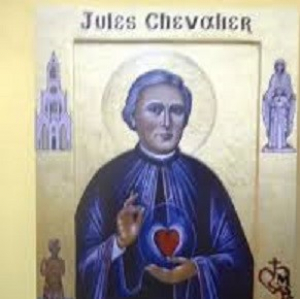Peter MALONE
Girl/ 2020
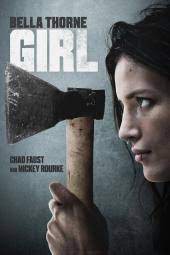
GIRL
US, 2020, 93 minutes, Colour.
Bella Thorne, Elizabeth Saunders, Mickey Rourke, Chad Faust, Lynette Ware, Glen Gould.
Directed by Chad Faust.
Girl is a rather grim, often ugly drama.
Bella Thorne portrays the unnamed Girl, seeking vengeance on her absent father, travelling to a down and out town to kill him. She finds him dead. She tangles with a strange and mentally unbalanced character called Charmer (played, in fact, by the director of the film, Chad Faust). If one hasn’t looked at the credits, the sheriff seems to be a Mickey Rourke lookalike (in his later age) – but he is Mickey Rourke.
The two brothers have killed the Girl’s father, wanting the money. Gradually a complex relationship between the two men, the Girl’s mother and the father emerges. A great deal of deception, the Girl finally wanting to confront her mother.
Perhaps a certain fascination in trying to find out Girl’s background and what is going on – but a great deal of grim violence and confrontations.
- The title focus? Girl having no individual name? Her background, her story, her quest?
- The settings, the bus in the countryside, the small town, down and out, the bar, the father’s home, the sheriff’s home? The outdoor settings, the yards? The musical score?
- The gradual opening out of the Girl’s story? Her vengeance, phone calls from mother, letters from her father, the money, her anger, intent to kill her father? Arriving in the town, sullen attitudes, the encounter with the sheriff, refusing the lift, the bar, the sympathetic bartender, Betty enigmatic, the Girl going to the hut, finding her father dead?
- The laundry, the encounter with Charmer, his talk, the violence? The sheriff, half-brothers? Taking the Girl, their killing her father, wanting the money, her being tied up, the attempted torture, digging up the bathroom tiles? Her getting free? Going back to the bar, stories from Betty?
- The phone calls to her mother? Her mother on the way? The revelation about the relationships, the mother’s back injuries, not telling her daughter the truth? The father, love for his daughter, the letters? The mother’s relationship to the sheriff and Charmer?
- The confrontation with Charmer, his death? The confrontation with the sheriff?
- Her mother’s arrival, the talk, the truth of the story, the Girl’s anger? Her mother leaving?
- The return to Betty, having to cope with future?
Truman and Capote: An Intimate Conversation
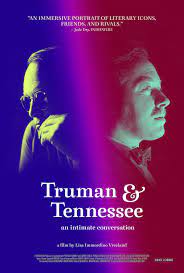
TRUMAN AND TENNESSEE: AN INTIMATE CONVERSATION
US, 2020, 86 minutes, Colour.
Voices of: Jim Parsons, Zachary Quinto..
Directed by Lisa Immordino Vreeland.
For fans of Truman Capote and Tennessee Williams, this is a must. For those interested in the novelist and in the playwright but who do not know so much about them, this is an arresting introduction. It has been directed by Lisa Immordino Vreeland, who has made documentaries on arts figures, Peggy Guggenheim, Diana Vreeland, Cecil Beaton.
There has been a great deal of archival research for this film, interviews and footage of both authors back in the 1940s and then throughout their careers, promotions of their work at the time, the reflections on their work. There are also quite a number of television interviews, some of them quite detailed in the personal questions, such as those by David Frost. It is interesting to watch the body language of how each of the author’ respond to the questions, how reticent they are, how forthcoming. It is also interesting to see how they age over the best part of three decades.
There are quite a number of quotations from the novels by Truman Capote, excerpts from the film version of In Cold Blood, from Breakfast at Tiffany’s (and his comments about the unsuitability of Audrey Hepburn in the central role but praising her performance).
There is a great advantage for Tennessee Williams and having a number of screen versions of his plays, including Marlon Brando and Vivien Leigh and Streetcar, an interview with Anna Magnani for The Rose Tattoo, several clips from Cat on a Hot Tin Roof, Sweet Bird of Youth, Night of the iguana, Boom, The Roman Spring of Mrs Stone, and the television version of The Glass Menagerie with Katherine Hepburn and Sam Waterston.
William’s comments on his lack of popularity and good reviews after the early 1960s. Capote he generally had good reviews throughout his career.
The film opens up personal issues, their homosexuality, William is going back into his past, the difficult relationship with his mother, and the lobotomies and electric shock treatment for his sister. It also shows his long-term relationships. It is the same with Truman Capote, speaking rather provocatively and ambiguously in the television interviews. Especially about love and friendship and sexuality. The film also tackles their increasing alcoholism and depression. And the sadness of the deaths, Williams from an overdose of barbiturates, the party as a result of alcoholism.
Capote’s work is often autobiographical, even in his exploration of the themes of the criminal mind and behaviour in In Cold Blood. Williams is very strong in making quite a number of connections from his theatre characters to his own life, family and experiences.
The film concludes with a tribute to both, Capote he and his contribution to fiction and dramatic reporting, Williams and his wide range of players and the introduction of so many of his themes and vocabulary to American culture – like dependence on the kindness of strangers by Blanche Dubois.
For many of the quotations the film uses the voices of Jim Parsons for Capote and Zachary Quinto for Willliams – and we believe we are hearing their voices.
This is the kind of documentary that excels in presenting portraits but also dramatising the works of the authors.
Blood Money
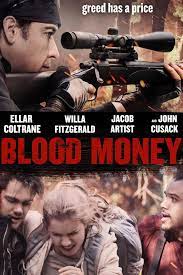
BLOOD MONEY
US, 2017, 100 minutes, Colour.
Ellar Coltrane, Willa Fitzgerald, Jacob Artist, John Cusack, Ned Bellamy.
Directed by Lucky McKee.
Blood Money is a contemporary moral/immoral story about the finding of treasure, bags of cash, and greed. It may remind audiences of The Treasure of the Sierra Madre, which seems to be the intention.
The focus is on three young adults, friends from the past, going on a wilderness excursion. The initial sequence is a happy, tracking, on the river. During the camping, some tensions arise, especially in the relationships. Ellar Coltrane (the young star of Boyhood) is in an ordinary job, satisfied with his life, still in love with school sweetheart, Lynn (Willa Fitzgerald). She is in a relationship with Jeff (Jacob Artist from Glee) who come from a rich family.
The film opens with Lynn and a threat and goes into flashback, especially the helicopter, the dropping of the money, Miller (John Cusack) parachuting out and then searching for the money, eventually pursuing the threesome.
Lynn’s character turns more obnoxious as the film goes on, greedy for the money, unscrupulous with Jeff, Victor not wanting to be part of the theft but wanting to help Lynn. Ultimately, a pessimistic ending.
More or less a routine action adventure.
- The title? The origins of the money? Miller and his taking the money, dropping it, the search for it? The three finding it, the different reactions, the consequences, violence and death? Greed?
- The settings, the wilderness, forests, rivers and rapids? The musical score? The tunnel, the silos?
- The introduction to the three characters, exhilaration, friendship from the past, Victor, his love for Lynn? Friendship with Jeff? Through the forest, on the river, the rapids, camping, happy moments, clashing, Jeff and Lynn?
- The finding of the money, the consequences? Lynn wanting it for herself? Victor and his not wanting the money? Jeff and his rich family background, supporting Lynn and her scholarship? The clash between them?
- The helicopter, the dropping of the money, the crash? Miller parachuting? The encounter with the three? The touch of menace? Victor encountering, the conversation, cigarettes? The nature of the money? Miller and his advice and talk for Victor, especially about relationships?
- Victor, returning to his friends, canoeing, Jeff and the knot, losing the bag with $2 million? Lynn and are becoming more obsessive, aggressive? Jeff’s rash directions, passing the crowd on the beach? Stranded?
- The confrontation with Miller, guns, the escape? Going to the tunnel? The dark, the length, the branches blocking the exit? Miller, his search, the other end?
- The confrontation in the tunnel, (and the prologue of the film)? The focus on Lynn, her defiance, antipathy towards Miller? Jeff, in the tunnel, Victor, being shot? Lynn and the shooting of Miller? Getting out of the tunnel – to where?
The Story of Roy Cohn Bully Coward Victim
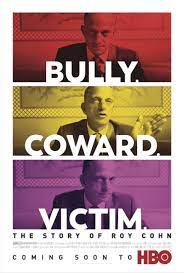
THE STORY OF ROY COHN: BULLY COWARD VICTIM
US, 2019, 91 minutes, Colour.
Directed by Irene Meeropol.
In 2018, a documentary was released, feature-length, Where is My Roy Cohn? It can be seen as complementary to this film. It is the same Roy Cohn so it is expected that there is a great deal of similarity, explanations of Roy Cohn’s background, his early successful career with Senator McCarthy, his anti-Communist fervour, his determination to win at all costs. There is also the story of his downfall and his attack on the Army, and his association with David Schine. There is also the story of his recovery, his links with the Mafia, his legal (and illegal) activities, his sexuality and relationships, his political connections with the Reagan, long support and promotion of Donald Trump, his contracting AIDS, public denials, his death.
This is all present in the current film, perhaps more detail about his finances, his tax avoidance, his manipulation of friends and associates, his planting stories in the media…
Everybody seems to agree that Roy Cohn was a loathsome person, many calling him a personification of evil. There is a great deal of footage from the period, of his activities with Senator McCarthy, of his business and influence associations with Mafia bosses, footage of him with Donald Trump and promoting him. And there are testimonies from Cohn’s biographer, associates, Cindy Adams and media connections, political figures, gay connections, as chauffeur, and his cousin, Don Marcus (with some loathing).
A great deal of attention is shown to the examination of Cohn’s accounts, gifts to his partner, the manipulation of books, and Cohn’s not paying his bills, sailing through an extravagant life. The film also emphasises the gay culture in his life, his frequent presence in the gay community in Provincetown, Massachusetts, eventually buying a house there. There are also his frequent visits, partnership with Steve Rubel, in the night club, 54.
What makes this film distinctive, very distinctive, is the focus on the trial of Julius and Ethel Rosenberg for espionage, secret documents on atomic science to the Russians, the court case, their execution. Cohn expresses absolute conviction that the conviction was correct as was execution.
The film opens with some of footage, one of the Rosenberg sons, Michael, with his children, including his young daughter, Irene, who is the director of this film. The stance of the film is that the trial of the Rosenberg should be re-examined, that there was manipulated testimony, that Cohn worked on the principle of “framing” those who are guilty in order to get the desired verdict. During the 1970s, Michael Meeropol, who had taken the name of his adoptive parents, along with his brother, raised issues questioning the trial, even going on television with Cohn himself. Michael Meeropol is seen in footage of the time, of the 70s, and in older age for this film.
Some of the commentary against this film is from people who are convinced that the Rosenberg’s were guilty, that this is a procommunist film…
Because of the extensive activities of Roy Cohn’s life, there is always a possibility for more and more studies, more and more films about particular facets (for example, his relationship with Donald Trump). Also included in this film are some sequences from the revived stage version of Tony Kushner’s Angels in America, scenes with Nathan Lane portraying Cohn (with some comments from Lane himself as well as Kushner).
Cohn is intriguing and repellent.
Mangrove/ Small Axe

SMALL AXE: MANGROVE
UK, 2020, 127 minutes, Colour.
Shaun Parkes, Letitia Wright, Nathanial Martello-White, Rochenda Sandor, Jack Lowdon, Adam Godley, Samuel West, Sam Spruel.
Directed by Steve McQueen.
Small Axe is a series of five films made for television, co-written and directed by Steve McQueen (director of many short films for 15 years then moving into features with Hunger, Shame, 12 years a Slave, Widows). Each of the films in Small Axe takes up themes of West Indians in the UK ranging from police, education, music…
Mangrove is the first and sets the tone. It is also the longest.
The year is 1968, a new generation of West Indians starting to grow up in London, with groupings in various parts of the city like Notting Hill. There is prejudice against the migrants, black migrants. And this is particularly the case with many of the London police, illustrated very strongly here.
At the centre is a dignified middle-aged man, Frank, played by Shaun Parkes, who opens a restaurant in Notting Hill, the Mangrove, serving specifically spicy West Indian food and offering a centre for West Indians to gather. The film shows the police and their bigotry, especially in the person of PC Pulley (Sam Spruell) who leads a number of raids attacking the Mangrove, false accusations about prostitution and drugs, with a great deal of smashing and destruction.
The film also shows a range of characters in Notting Hill, the young woman influenced by the Black Panther movement in the US, wanting protest. Some are in favour, some prefer legal action. They are strong characters and their convictions are presented in the context of their lives in London.
Ultimately, there is a protest and the police arrest a number of those participating, including Frank, and charge them with affray. They meet with lawyers, some wary about the defendants defending themselves but that is the decision made. There is also a rather cheeky young lawyer played by Jack Lowdon who represents the defendants as they defend themselves. Adam Godley is the rather supercilious judge. Samuel West is the rather superior prosecutor.
The courtroom sequences are very strong, the judge taking severe stances, refusing applications by the defendants, discriminating in his treatment of those in court, in the Old Bailey. There are scenes where Frank is being persuaded to plead guilty and have a lesser sentence – but persuaded not, then some strong scenes of the defendants defending themselves and a powerful speech by the final speaker.
While the jury finds all the defendants not guilty, information given later is attacks from the police continued with the Mangrove until 1993 and that it continued to be raided many times.
Here is a film of 2020 which is still relevant to race issues.
- The first in the series of Small Axe, setting the tone? UK, West Indies migrants, settlement, racism?
- The work of Steve McQueen, 12 Years a Slave, Hunger, the range of stories for Small Axe?
- 1968, the status of West Indians, Enoch Powell political comment? Race prejudice and ordinary citizens? Protest, the courts? The later riots, Brixton, the 21st-century?
- The Notting Hill setting, the suburban streets, the shops? The Mangrove restaurant? Police precincts? Protests? The law courts, the court itself, the rooms, prisoner areas? The musical score?
- Frank Critchlow and his story, West Indian background, his age, friends, the idea for the restaurant, taking over the Mangrove, setting it up, a centre for the West Indians in Notting Hill, a centre for joy and support?
- The police, PC Pulley, in the car, his associates, expressions of bigotry, violence, racism? At headquarters, the jokes about racing violence? The attacks on the Mangrove, the intrusion, bashing, smashing? The repetition?
- The locals in Notting Hill, Barbara, her hair, her husband, life at home, the child, the arguments, demonstrations and convictions?
- Television, the interview with the West Indian, his plea, issues?
- Althea, the background of the Black Panthers, the meetings, her tough stances, the rallies? Her leadership? The pregnancy?
- The variety of other characters, at the Mangrove, friends of Frank? Pros and cons, the idea of protest, the atmosphere of the 1960s? The agreement? Frank going to the march? The police observing, going into action? The charges? Assault and affray?
- The lawyers, discussions, the older lawyers and their recommendations, Ian McDonald, his age, the touch of freshness? The various meetings, discussions, plans? Being cheeky? The issue of whether the defendants should defend themselves?
- In court, the formalities, British justice, the Old Bailey and its atmosphere? The judge and his attitudes? Treatment of the case, treatment of the defendants, of the public, his decisions, harsh? The interjections? Excluding visitors? The exhibition of police brutality towards the defendants, isolating them?
- The prosecutor, his attitude, the range of questions, the police, lies and deception? His supercilious manner? The judge listening, intervening?
- The range of speeches, the defendants, their cross-examining witnesses, the police? The exposure of Pulley?
- Frank, observing, the issue of his pleading guilty or not? Althea and her strong speech?
- The final, the defence speech, powerful, emotional, the effect?
- The role of the jury, objections to the jury, Black members of the jury, men and women, their faces as they listen to the evidence? The return, the verdicts?
- The achievement of the time, Frank continuing with the Mangrove to the 1990s, yet the continued raids? The importance of this kind of film in the 2020s?
Protect and Serve

PROTECT AND SERVE
US, 2019, 110 minutes, Colour.
Thomas Jane, Luke Kleintank, Josh Hopkins, David Krumholz, Bridget Moynihan, Scottie Thompson, Gregg Bello.
Directed by Joel Souza.
The original title for this police film is Crown Vic, after the cars used in LA, Lincoln Crown Victoria. Protect and Serve as a title for Australia. In the Web of Violence is the title for Germany. Bulletproof is the title for the UK.
While there is a great deal of action in the film, there is also a great deal of talk and discussion, especially about the role of the police, night patrols in the city, the variety of situations and characters that emerge, a lot of banter between the police, advice for the rookie by the experienced night patrol, the rookie reflecting on his family and his relationship with his police father who abandoned the family, with his pregnant wife.
The central character played by Thomas Jane, very effectively, says that his home is in his car, patrolling for almost quarter of a century. However, there have been hardships and setbacks in his life and he is very much concerned about finding a missing little girl. Luke Kleintank, who has appeared more in television series and television films than for the cinema, is the rookie, initially instructed by his partner, mocked by other police, forced into situations he was not anticipating, even challenges to his conscience.
There are quite a number of cameos throughout the film, the range of characters met throughout the night, especially Bridget Moynihan as a junkie and the issue of her abandoning her daughter. Very sinister is the presence of Josh Hopkins as a manic policeman, bravado, violence, attacking suspects, egged on by a differently sinister partner, David Krumholz.
In some ways, this is very documentary-like, the night in patrol by two LA cops. Ultimately, there is a very confronting sequence, the finding of the little girl, and the veteran shooting the perpetrator.
In many ways, though a heightened night, this is a much more realistic look at the life of ordinary police and the demands made on them professionally, continually in danger, and the repercussions for personal lives.
- The variety of titles and their angles?
- Los Angeles, one night, the Olympic area, the patrol cars, the officers on patrol, having to be alert, the variety of calls, the variety of situations, the dangers, guns, uncertainties?
- The importance of dialogue, the discussions between Ray and Nick? Nick’s explanation of himself, motivations, training, in the country, the influence of his father and brothers, marrying, his wife expecting (and her continued phone calls and his exasperation), Ray taunting him about marriage fidelity, coming to the city, his training, his first night on patrol, his ambitions? Ray, 25 years experience, at home and his patrol car, his past mistakes? Instructing Nick, advice, repetitions?
- Other members of the police, jokes and banter, especially at the expense of the rookie? The encounter with Jack and Stroke? Jack and his background, mania, shouting, insults, out of control, Stroke, small, giggly, encouraging Jack? The later encountering the Street, Nick threatening Jack, the guns, Ray and his intervention, Jack and his bashing of the prisoner, Stroke and his laughing, Ray taking charge? The repercussions of life on the beach?
- The range of characters, the opening with the masked robbers, gunfire, the chase and their escape? The character who through a brick at the car? Claire, calling the police, high, sexually provocative, the husband arriving, her reaction to Nick, Ray searching, the confrontation and taking the husband to jail? The various chases, the characters in the back of the van?
- The episode with Tracy, junkie, past relationship with Ray, the daughter, Floyd, the interview, stripping him in the street? The story of the girl? Ultimately, Ray taking off his badge, going to the house, getting the girl, the man and his defiance, Ray shooting him? The impact for Nick? The previous check on his conscience with Jack running over a suspect, beating him, Jack claiming that he was helping the police in their work?
- The pause, having something to eat, talking, Nick learning, talking to his wife?
- The end of the day, the audience sharing the night with the police and the patrol? The audience learning about police work, hazards, demands, effects?
Palau
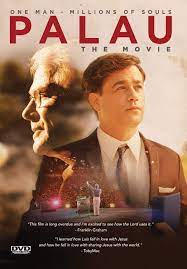
PALAU
US, 2019, 116 minutes, Colour.
Gaston Pauls, Santiago Achaga, Augustin Amoedo, Alexia Moyano, Alexandra Bard, Darren Dowler, Manuel Ramos, Daniel Roebuck,
Directed by Kevin Knoblock.
Evangelical preacher, Luis Palau, was not on this reviewer’s radar. This was a reminder that those who belong to particular churches are very much involved in the life of those churches and not aware of what happens in other religious groups, their religious leaders, different aspects of faith, approaches to the Scriptures, Gospel injunctions, confessions of faith. And there is the difference between Christians who emphasise the word of God, listening to the proclaimed word, preaching, and Christians who also have a more sacramental approach, religious rituals and celebrations.
Which means that this film is important for Evangelical Christians who know and know of Luis Palau, and that it is an opportunity for those unfamiliar with Evangelical Christianity to observe and to learn. It can be noted that this strong perspective on Evangelical Christianity is in no way aggressive towards others, no criticisms, no suggestions of any rivalries. Where it can be of interest to Catholic communities is that it highlights the growing presence of Evangelical Christianity in Latin America, inviting the audience to accompany Palau and his faith and preaching journey, its style, its impact.
The film is straightforward in its style of storytelling (not arthouse cinema style), making it immediately accessible to its intended audience. It is biography, admiring of its subject, showing his abilities as well as difficulties, not a hagiography. Rather, an acknowledgement and tribute.
Luis Palau was born in Argentina, the film showing glimpses of his early years, the conversion of his father, his father’s reading the book of Proverbs, a chapter a day, his father’s sudden death from pneumonia because medical supplies were limited because of the war. It is 1944. The young Luis is devoted to his warmly caring mother. And he does hear a radio broadcasts by Billy Graham which stirs his imagination about preaching.
The film shows him 10 years later as a young man, working in an office, but motivated by preaching the word, organising brief radio programs, supported by his co-work in the office, drawing the attention of visiting American evangelical authorities who suggest moving to the United States for theological education and training.
The film then moves ahead another 10 years with Luis in Portland, Oregon, now married to local teacher, Pat, beginning a family (the film not showing anything of courtship, marriage). There is a happiness of his mother’s visit. While their situation is difficult, there is help from the local church authorities, and the proposal that they go to Colombia for mission work, which they do, and with the help of Luis’s co-worker from the past, Jorge. One of the main activities in Colombia, 1966, is the organisation of a mass rally in Bogota, an invitation to all the church to participate, initial suspicion from the authorities, but Luis preaching to an assembly of 20,000 people, urging a new life and conversion.
There is a small significant sequence with Luis in the United States, he and Pat going to a Billy Graham rally, Billy Graham himself sitting with them at a lunch break, friendly, encouraging. The sequence is very short but Billy Graham makes a very strong impression – and then invites Luis to stand on the stage with him translating, with the same intense enthusiasm, Billy Graham’s words for the Hispanic community.
There is also a sequence, in the Presbyterian Church, where Luis is preaching and it has an effect on a member of the congregation who stands and confesses what is wrong with his life – leading to family reconciliation and people further confessing.
The sequences are very reminiscent of African-American evangelical churches and the congregations, very much alive, singing, praising, confessing. Luise’s services are not quite so emotional, more low-key.
And that is where the narrative of the film finishes. What follows is information about Luis Palau‘s ministry, a 60 year ministry, his dying in early 2021. He was considered something of a second Billy Graham. He preached with energy over the next decades, glimpses of rallies included from all over the world. He wrote books. He was very prominent in a radio ministry. The screenplay of the film, written by its director, Kevin Knoblock, who has made many documentaries (ranging from a study of George Washington to Pope John Paul II’s nine days visit to Poland) stays with the faith ministry and does not include any of the social issues, sexuality issues, that preoccupy militant Evangelicals.
At the end, there is a clip of a television interview with Luis Palau himself. He has quite some verve in his old age, something of a twinkle in his eye, energetic gestures – which made this reviewer realise the limitations in the performance and the direction of the actor, Argentinian Gaston Pauls, in communicating the early life of Luis Palau. The actor is very serious, sometimes rather dour, and, in retrospect, not particularly charismatic at all. So, it was something of a relief to get the moments of the actual Luis Palau.
This is a significant film for evangelical Christians. It is a film of interest for non-evangelical Christians, a reminder of the presence and power of these faith-based communities.
- A Faith-inspired film? Drama rather than documentary? The impact for evangelical audiences? Non--evangelical audiences? Non-faith audiences?
- Audience knowledge of Luis Palau? Argentinian, his story, his father’s conversion and religious beliefs, evangelical, the war situation and his father’s dying of pneumonia? At home, his bond with his mother? Listening to Billy Graham, inspired, wanting to preach? 10 years passing, going to work, his faith, his co-worker and their friendship, his doing the radio broadcasts, his co-worker hearing him, encouraging him? The visit of the evangelical preacher, affirmation, training in the United States, his going there?
- The transition to the 1960s, Luis in Oregon, the fact that he is married, no dramatising of the courtship and early years? His mother’s visit? His children? His mother and meeting Pat? The training, possibility for preaching, establishing churches?
- The importance of the sequence with Billy Graham, Billy Graham and his charismatic personality in a short sequence, at the table, friendly, talking about their work? Luis and his being a translator for Billy Graham at the rally, finding his preaching voice and inspired by audience response?
- The discussions with the local evangelical members, decisions about churches, the impact going to Columbia, setting up there, the difficulties? Jorge and his arrival? The work in Columbia, the churches, government issues and difficulties in the 1960s? The decision about the rally, the invitation to all the churches, letting everybody know, notices? The assembly itself, the inserts from actual footage of the occasion? Luis, Jorge, in the vehicle, the announcement, loudspeakers, the police official and his nodding? The 20,000 people, the range of churches, everybody invited, an invitation to conversion and a new life?
- Luis and his work in the Presbyterian Church, preaching, the man confessing his sins, reconciliation with his family, the beginning of the confessing and acknowledging of sins during the preaching?
- The actor portraying Luis, very serious, not smiling? Somewhat dour and uncharismatic in his dealings with people? His coming alive during the preaching, a different personality?
- The end of the film, the images of the actual Luis Palau, his preaching, the information about his ministry, a second Billy Graham, preaching all over the world, the hundreds of thousands in his congregation, his writings, radio broadcasts? A 60 year ministry?
- The final image of Luis Palau himself, elderly, but full of energy, eye twinkle, gestures, persuasive (more charismatic than the actor who portrayed him?)? The film as a tribute to him and an opportunity for evangelical Christians to appreciate him and his ministry?
- An eye and mind opening experience for non--evangelical Christians?
Fr Chevalier, October 21st, 1907, anniversary of his death
Fr Chevalier, October 21st, 1907, anniversary of his death
![]()
Today is the Death Anniversary of our Founder, the Servant of God, Fr. Jules Chevalier, MSC.
Here is an excerpt from the notes of Fr. Charles Piperon, MSC at the moment Fr. Chevalier rejoined our loving Lord:
"...like the flickering out of a flame, he fell peacefully asleep in the Lord. The clock struck half past five and the evening Angelus was ringing in the parish. Thus died our venerated and beloved Father, surrounded by his intimates and by some of his religious who had come from various parts to assist at his last hour and to render him their final respects. He had lived eighty-three years, six months and six days, the greater part of which--fifty-three years--had, by a special design of divine Providence, been spent in the town of Issoudun." (from Le T.R.P. Chevalier. Simple Notice Biographique.)

Never Grow Old
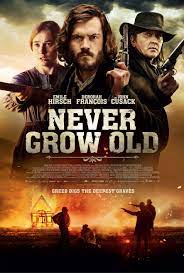
NEVER GROW OLD
Ireland, 2019, 100 minutes, Colour.
Emile Hirsch, John Cusack, Deborah François, Molly McCann, Quinn Topper Marcus, Sam Louowyck, Danny Webb, Tim Ahern, Antonia Campbell-Hughes.
Directed by Ivan Kavanagh.
This is an Irish production – although it is set in the American West, 1849, the central character an Irishman. He is played by Emile Hirsch, was migrated with hopes to the United States with his wife, Deborah François, and his children. He has found employment as the carpenter for the town as well as the coffin maker.
This is a very dark film, much of it filmed at night and in the dark.
It opens with an ominous scene, a man striding into a church. The rest is flashback, explaining that it is Patrick going into the church confronting an embodiment of evil, Dutch, played with sinister confidence by John Cusack.
The town is in control of the Temperance Movement, and a fiery preacher with his wife. Patrick has found a place there but would like to move on to California. His wife, on the other hand, is content to stay.
Difficult experience for Patrick, being summoned by Dutch and his associates to point out the wife of a man who has betrayed Dutch. She and her daughter are forced into prostitution, the daughter later shooting a client, tried and hanged.. Dutch takes possession of a hall and turns it into a saloon, defying the governance of the town. Patrick is caught up with Dutch, providing coffins, unwilling to be in Duchess control. The crisis occurs when one of Dutch’s associates who had leered at Patrick’s wife initially, assaults her and he is summoned by his son to her help.
Dutch has told Patrick that he will never shoot – but he does, finally going to the church to shoot Dutch, who shows signs of fear as he is about to die.
An ironic title for a Western where so many never grow old.
- 1849, the American West, the frontier, the towns, townspeople, the wild West, the reformed West?
- The locations, the town, homes, the fields, church, cemetery, funerals, the saloon? The feel of the west? The musical score? Hymns?
- So much of the action taking place at night, in the dark, a story of darkness and shadows? Symbolising evil?
- The town, the women and the temperance movement, no alcohol, no prostitution? The townspeople agreeing? Preacher Pike and his control, his speeches, intensity, the support of his wife? Life within the town, not making money, but peaceful?
- Patrick and his family, from Ireland, his wife from France, their life in the town, and intention to go to California, his staying, supporting the temperance behaviour, Audrey, not wanting to move, happy in the town? The two children, their life? Patrick, carpenter, his work as an undertaker?
- The initial sequence, the man with the gun, going into the church? The rest of the film as flashback, Patrick entering into the church, to confront Dutch?
- Dutch, his associates, Dum Dum and the loss of his tongue, sinister? Coming in the dark? Questioning Patrick, putting on the pressure, his taking them to the house, the wife and her fear, their attack? The story of her husband, taking the money? His death? The forcing of the wife and daughter into prostitution? The sad consequences, the daughter at the saloon, the man, getting his gun, her shooting him? Being taken, arrested, the trial, her being found guilty, Patrick building the gallows despite Audrey’s pleading? The execution, the crowd, the mother, the girl and her fears, cloth over her head, hanging?
- Dutch, his background, the decision to settle, to make money, getting the bar, setting it up, alcohol, getting in the prostitutes, the bar manager and his subservience?
- Dutch, the pressure on Patrick, Patrick and his fear, selling his soul, doing Dutch’s bidding? Dutch and the killings? The funerals.
- Audrey, her life in the town, hospitality to Dutch, Dum Dum and his leering? His return, the attack on Audrey? The knife, her killing him? Getting the children to get Patrick. His vengeance despite Dutch saying he would not? Going to the Church, the confrontation, his fear?
- Patrick and his apology to his son, his wife’s death? His being wounded?
- The final close-up of Patrick? Alive? Dead?
- The impact of such a grim Western?
Into the Arms of Danger
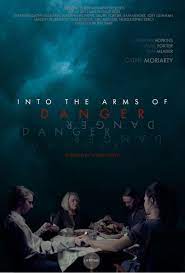
INTO THE ARMS OF DANGER
US, 2020, 86 minutes, Colour.
Cathy Moriarty, Alex Ann Hopkins, Laurie Fortier, Sam Meader, Joey Luthman, Mason Trueblood, Tom Keische.
Directed by Jeff Hare.
A Lifetime, pastime entertainment, an abduction story.
A lot of the material is familiar, the focus on a young woman, about to go to college, experiencing the death of her father, experiencing the hyper- protectiveness of her mother. At a party, she encounters a young musician and is persuaded to go to a concert. On the way, talking with her mother on the phone, she has a car crash, calling 911 and paramedics arriving.
So far, so familiar. However, the paramedics are fakes. Their father has left the family an ambulance he bought at auction. They abduct the young girl, bring her to their mother who identifies her as her runaway daughter. There are the expected confrontations, cruelty on behalf of one brother, especially with the identification brace on the girl’s leg. The other brother is rather sympathetic but dominated by his mother. And the mother is played, with reviewer, by Cathy Moriarty (40 years after her introduction to films in Raging Bull).
The mother searches for her daughter. The police don’t seem to particularly interested, just another case. The musician works on the phone call made by the daughter – who gives a clue to her mother by giving her best wishes to her father who is dead. One of the ironies is that the mother distributing posters for her daughter actually visits the home where she is imprisoned.
Eventually, using the information about locations, the mother fakes a call so that the fake paramedics turn up again. She follows them and there is a confrontation.
Someone remarked that it is a good Lifetime entertainment, just a right amount of cheese in this and suspense.
- A television pastime? Family issues? Abduction and investigation?
- The American town, homes, parties, police force and investigations? The home in the country, interiors, basement, sinister? The musical score, atmospheric?
- The title? Dangerous Momma?
- Jenny, her age, the party, her friend, the drink accident, drink, apology, talk, musician, the invitation to the concert? The car breakdown, her mother’s anxiety, ultra-protective, turning up, insulting Drake? Jenny’s reaction? The mother having to go to a conference, the phone calls? Jenny deciding to go to the concert, driving, talking to a mother, the crash, calling 911, her mother reassured returning? The paramedics, interrogation, the syringe, the abduction?
- The abduction, the two brothers, the cruel brother and the bracelet, his treatment of Jenny? The other brother, reticent, but dominated by their mother? The situation, the mother and her daughter running away, the substitute daughter?
- Momma, tough, dominating her sons, their bringing in substitute daughters? Her treatment of Jenny, imposing, demanding, the cooking, as a daughter?
- Jenny’s mother, finding Drake, Jenny and the phone call, the clue with greetings to her dad? Drake, the analysis, his going to rescue Jenny, the encounter, the attempted escape, his death? The mother, the police, routine case, not particularly interested? The mother, the posters, distributing them, actually going to Momma’s house and talking with her? Jenny seeing her mother?
- Jenny, pretending to be the loving daughter? The treatment by Clyde? Her coming onto Guy, his mother’s reaction, relegating guide to the basement?
- Jenny, the attempted escape, Momma making Guy lock her in the basement, Jenny discovering the daughter’s bones?
- The mother and her shrewdness, going to see the mother of the previously abducted girl, the gun? The setup, the phone call, the pretence? The paramedics, her following them, to the house, the fighting, guy learning the truth, his mother killing him? Momma being overcome?
- The reconciliation? The moral about being protective and overprotective?
- The sequence in the institution, Momma, getting ready for the meal, seeing the guard as a substitute daughter?
